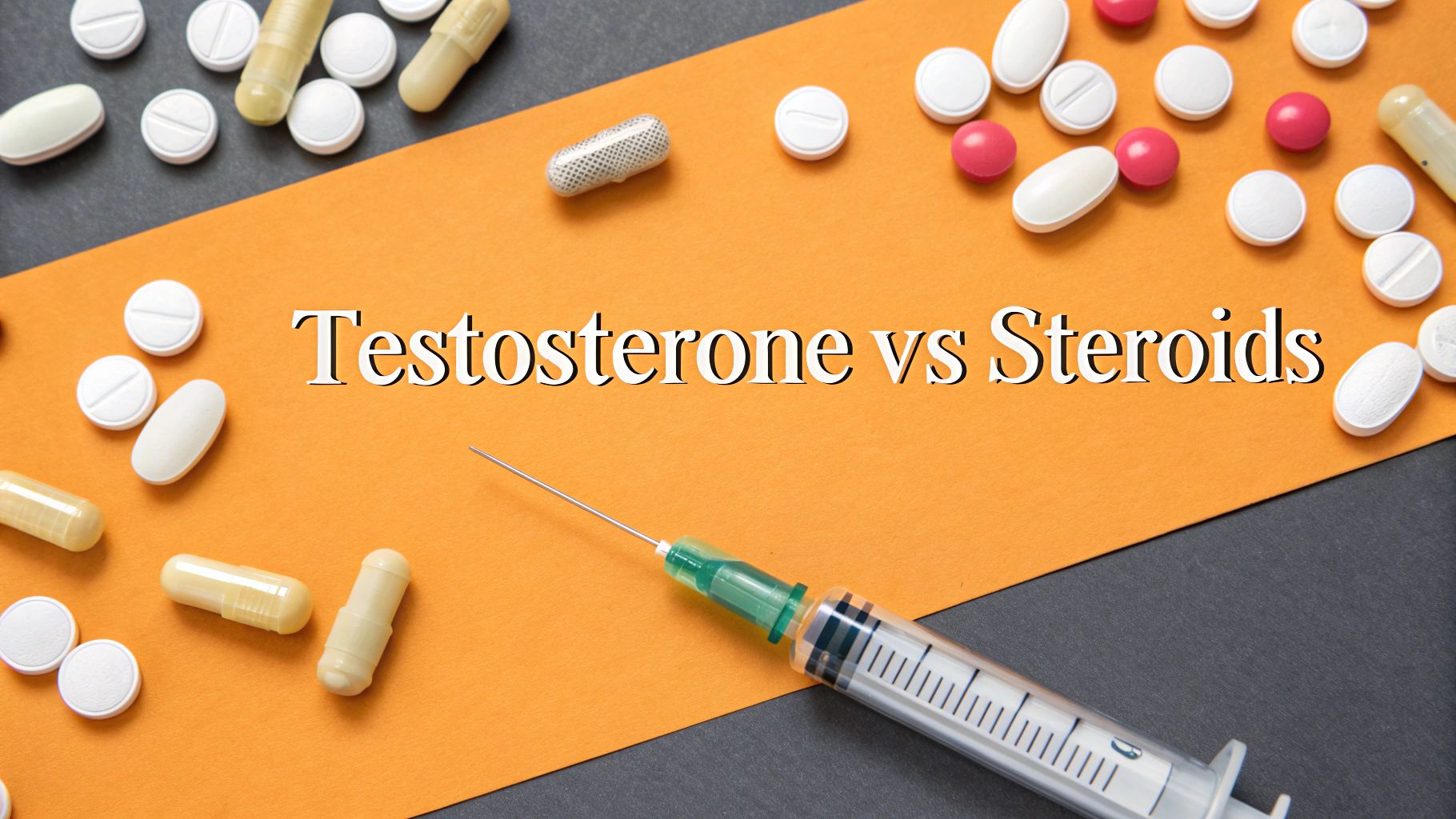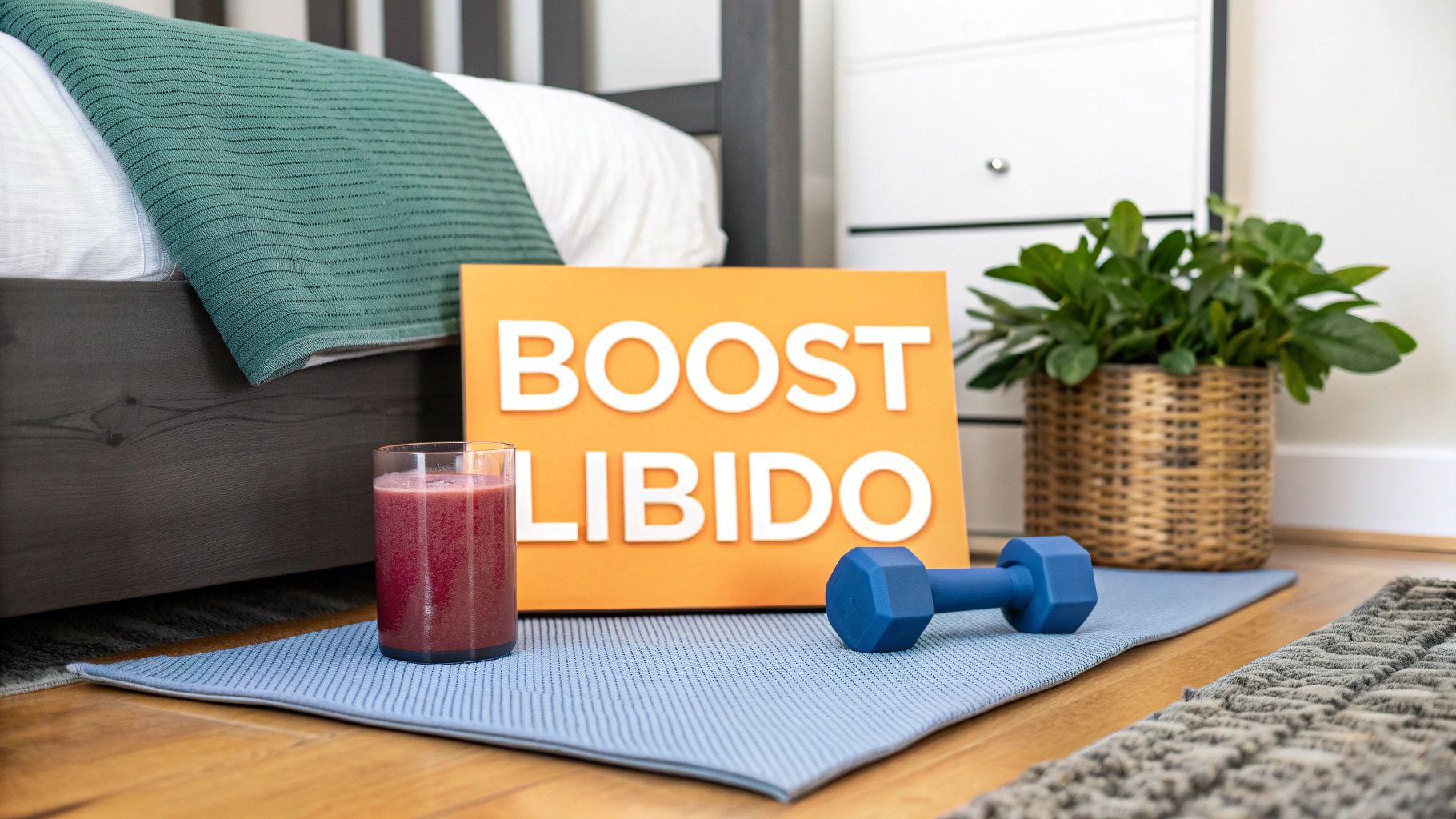Low Testosterone and Anxiety The Hidden Connection
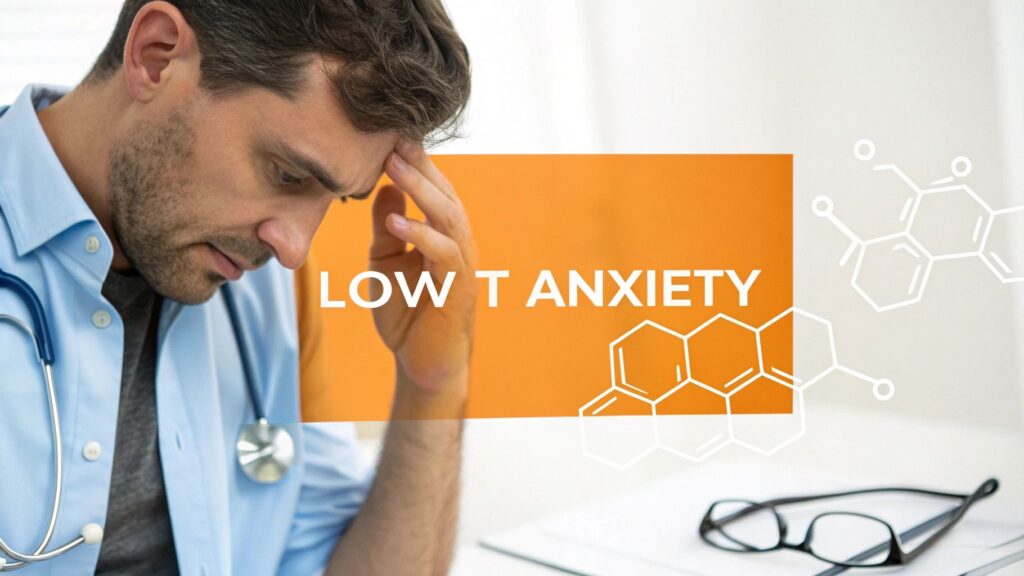
If you’re wrestling with anxiety that just won’t quit, the root of the problem might be hiding somewhere you haven’t thought to look: your hormones. There’s a powerful, often-missed connection between low testosterone and anxiety, where a dip in this crucial hormone can directly throw your emotional well-being off-kilter. This isn't just a vague feeling—it's a real, physiological issue that starts with your body’s chemistry.
The Hidden Link Between Your Hormones and Mood
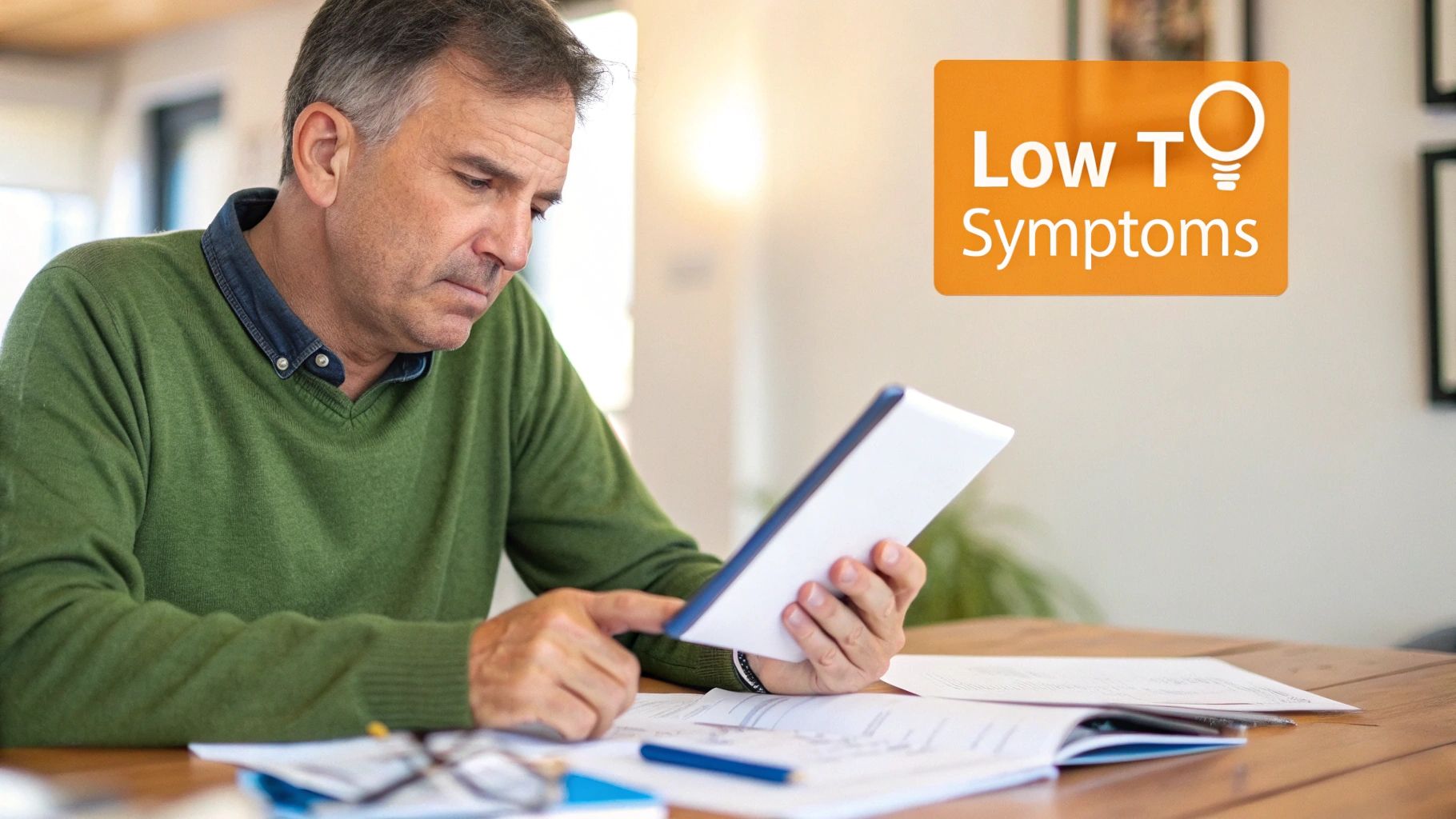
When most of us hear "testosterone," we immediately think of muscle mass and sex drive. And while it’s absolutely essential for those things, testosterone also plays a massive role in regulating your mood and mental resilience. Think of it as the steadying hand that keeps your emotional state on an even keel.
But when those testosterone levels fall, that steadying hand is gone. The result? Things can start to feel chaotic. You might find yourself grappling with a sense of unease, sudden irritability, or even flashes of panic. This hormonal shift disrupts the delicate balance of neurotransmitters in your brain, essentially leaving you more vulnerable to the very real symptoms of anxiety.
More Than Just a Feeling
This connection isn't just theoretical; it's backed by solid clinical data. Men diagnosed with hypogonadism—the medical term for clinically low testosterone—are far more likely to experience anxiety disorders than men with normal hormone levels.
In fact, a major meta-analysis found that men with this condition have a significantly higher prevalence of both anxiety and major depressive disorder. You can read more about these clinical findings to see the research for yourself.
What this means is that the constant worry or sudden panic you're feeling might not be a standalone psychological issue. It could be your body sending a clear signal that a foundational piece of your health is out of whack. Recognizing this link is the first real step toward finding a solution that tackles the root cause, not just the symptoms.
"Viewing testosterone as a key mood stabilizer reframes the conversation around anxiety. It shifts the focus from a purely mental struggle to a physiological one that can be measured and addressed directly."
Identifying the Overlap
One of the biggest hurdles in getting the right diagnosis is that the symptoms of anxiety and low testosterone can look almost identical. This creates a confusing picture that can make it tough to figure out what’s really going on without proper testing.
This table highlights just how tricky it can be to tell these two conditions apart based on symptoms alone.
Key Signs of Low Testosterone and Anxiety Overlap
| Symptom | Associated with Low Testosterone | Associated with Anxiety | Potential Overlap |
|---|---|---|---|
| Persistent Fatigue | Yes | Yes | A classic symptom of both, making it hard to distinguish the cause without further investigation. |
| Irritability & Mood Swings | Yes | Yes | Both conditions can shorten your fuse and lead to unpredictable emotional responses. |
| Difficulty Concentrating | Yes | Yes | "Brain fog" is a common complaint, whether it's from hormonal imbalance or mental distress. |
| Sleep Disturbances | Yes | Yes | Trouble falling asleep or staying asleep is a hallmark of both low T and chronic anxiety. |
| Low Libido | Yes | Yes | While a primary sign of low T, anxiety and stress can also significantly impact sex drive. |
| Loss of Motivation | Yes | Yes | Apathy and a lack of drive can be driven by either hormonal deficiencies or psychological strain. |
Seeing these symptoms laid out makes it clear why so many men struggle to get to the bottom of their anxiety. They might spend years trying to manage what they believe is a purely psychological issue, never realizing that a hormonal imbalance is fueling the fire.
By acknowledging that your anxiety could have a hormonal origin, you open the door to a completely new set of solutions. Instead of just focusing on stress management, you can start exploring ways to restore your body's natural hormonal balance—setting the stage for lasting mental clarity and well-being.
How Testosterone Shapes Your Brain Chemistry
To really get the connection between low testosterone and anxiety, you have to look inside the brain. It's easy to think of testosterone as just a hormone for muscle and libido, but it's also a master regulator of your mood, stress response, and sense of confidence. It's working behind the scenes, making sure the emotional control panel in your brain is functioning smoothly.
When your testosterone levels are where they should be, it acts like a skilled bouncer for your brain’s stress system. It helps keep the amygdala—often called the brain's "fear center"—from flying off the handle at every minor inconvenience. This hormonal balance is what allows you to feel calm, focused, and in control when life throws you a curveball.
But when T levels drop, that bouncer is off-duty. The gate to your stress response is left wide open, letting a flood of alarm signals overwhelm you. This is why a simple traffic jam can feel like a major crisis, or a nagging worry can spiral into a full-blown panic attack. Your brain has lost a key tool for managing its own alarm system.
The Neurotransmitter Connection
Testosterone's reach extends to the very chemicals that run your mood. It fine-tunes the activity of key neurotransmitters, which are the chemical messengers carrying signals between your brain cells.
- GABA (Gamma-Aminobutyric Acid): Think of GABA as your brain’s primary braking system. Testosterone helps this system work correctly, putting the brakes on anxiety. Low testosterone weakens this system, leaving your mind in a state of constant acceleration with no way to slow down.
- Serotonin: Often called the "feel-good" chemical, serotonin is essential for mood stability and a general sense of well-being. Testosterone supports healthy serotonin activity. When testosterone dips, it can throw these pathways out of whack, contributing to both anxiety and depressive feelings.
- Dopamine: This is the neurotransmitter of motivation, pleasure, and reward. Healthy testosterone levels keep dopamine flowing, helping you feel driven and engaged with life. When T levels fall, motivation can plummet, leading to the kind of apathy that often walks hand-in-hand with anxiety.
This isn't just a vague "feeling." It's a tangible chemical shift in your mental state. You’re not just feeling anxious—your brain is chemically wired to be more anxious because its hormonal regulator is missing in action.
By influencing the brain's fear center and the chemicals that promote calm, testosterone acts as a natural buffer against anxiety. When that buffer wears thin, you’re left far more vulnerable to stress and worry.
A Deeper Look at the Stress Axis
Testosterone also has a direct line to your body's main stress response system, the hypothalamic-pituitary-adrenal (HPA) axis. This is the system that controls the release of cortisol, your primary stress hormone.
Under normal conditions, testosterone helps keep the HPA axis in check, preventing it from going into overdrive and flooding your body with cortisol. But when testosterone is low, the HPA axis can become dysregulated. It starts overreacting, pumping out way too much cortisol and leaving you feeling perpetually tense, on edge, and "wired." This chronic state of high alert is a textbook feature of anxiety disorders.
The link between low testosterone and anxiety involves real, measurable changes deep inside the brain. For instance, research has connected low testosterone to structural changes in the hippocampus, a part of the brain crucial for managing emotions. Studies have shown it can lead to a reduced expression of certain receptors, which in turn correlates with more anxious behaviors. You can discover more about these neurobiological links to see just how deep this connection runs.
In the end, the science is clear. The relationship between low testosterone and anxiety isn't a coincidence; it's a matter of brain chemistry. Testosterone is a powerful neuroactive hormone that builds your resilience to stress from the inside out. When it declines, your mental defenses are lowered, leaving you exposed to the psychological and physical fallout of anxiety. Recognizing this biological foundation is the first step toward finding a real solution.
Pinpointing The True Cause of Your Anxiety
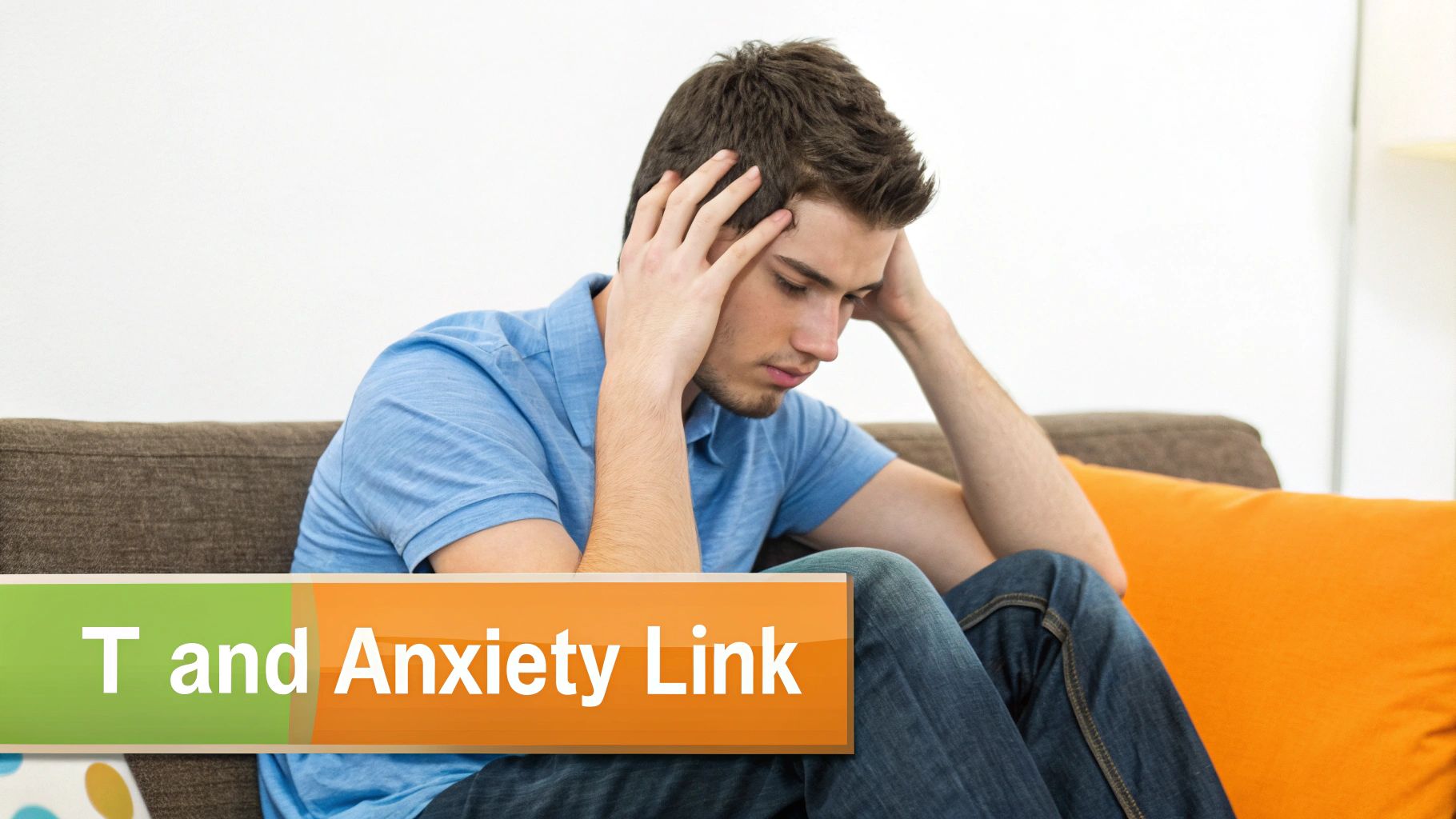
You feel anxious, but the typical explanations—work stress, burnout, life pressures—just don't seem to cover it. When the link between low testosterone and anxiety is a possibility, figuring out the real root cause can feel like trying to solve a puzzle with pieces from different boxes. The symptoms overlap, creating a confusing picture that makes it tough to know where to even start.
But if you look closely at the full spectrum of what you're feeling, you can start to see patterns that point toward a hormonal issue. This isn't about diagnosing yourself, but about arming yourself with the right information for a productive conversation with your doctor.
Looking Beyond General Anxiety
Generalized anxiety often centers on a constant, nagging worry about everything from finances to health. It’s a feeling of dread that hangs in the air, often joined by restlessness and an inability to switch off.
While low testosterone can definitely crank up the volume on those feelings, it usually brings a distinct crew of physical and cognitive symptoms along for the ride.
Think of it this way: if your anxiety is the smoke, low testosterone might be the fire. To find the source, you have to look for clues beyond just the emotional storm.
- Profound Physical Fatigue: This isn't just feeling wiped out after a long day. It's a deep, bone-deep exhaustion that sleep never seems to fix.
- Noticeable "Brain Fog": You're struggling to concentrate, grasping for words, or just not feeling mentally sharp. This is a step beyond the distraction that can come with everyday anxiety.
- A Slump in Libido: A significant drop in your sex drive is one of the classic calling cards of low testosterone. While stress can certainly dampen libido, a consistent and total lack of interest is a major red flag for a hormone problem.
If these physical symptoms are showing up alongside your anxiety, it's a strong signal that your hormones might be the primary driver.
The Decisive Step: Getting Tested
Tracking your symptoms is a crucial first step, but the only way to know for sure is through a medical diagnosis. Guesswork and online quizzes won't give you the clarity needed to build an effective plan.
Fortunately, the diagnostic process is straightforward and empowering.
Your doctor will likely start with a detailed conversation about your symptoms, medical history, and lifestyle. This is vital for ruling out other potential culprits, like thyroid disorders or vitamin deficiencies. Be ready to talk openly about everything—both mental and physical—to give them the full picture.
The gold standard for diagnosing low testosterone is a simple blood test. This measures your total and free testosterone levels, providing clear, undeniable evidence of where you stand.
This is the moment of truth. The blood test cuts through all the confusion and confirms whether a hormonal imbalance is at the core of your struggle. Because testosterone levels fluctuate throughout the day, your doctor will likely test you in the morning when your levels are at their natural peak.
For those interested in convenience, there are also ways to begin the process from home. You can learn more about how to check hormone levels at home to see what options are available.
Getting tested is the single most important action you can take. It turns a vague concern into a measurable data point. Armed with that information, you and your doctor can finally stop guessing and start creating a targeted plan to restore your hormonal balance—and with it, your peace of mind.
Your Guide To Effective Treatment Options
Once you've confirmed that a hormone imbalance is at the heart of your anxiety, the next step is mapping out a clear path forward. Finding the right solution means understanding all the tools available to get your testosterone levels back where they should be—and restoring your sense of well-being in the process. This journey usually involves a powerful, two-pronged approach: smart medical intervention combined with strategic lifestyle adjustments.
The primary medical treatment for clinically low testosterone is Testosterone Replacement Therapy (TRT). The goal here is simple: bring your testosterone levels back into a healthy, optimal range. By supplementing what your body is no longer producing on its own, TRT gets straight to the hormonal root of your anxiety, fatigue, and other related symptoms.
This infographic paints a pretty stark picture of just how common anxiety is for men with low testosterone compared to those with normal levels.
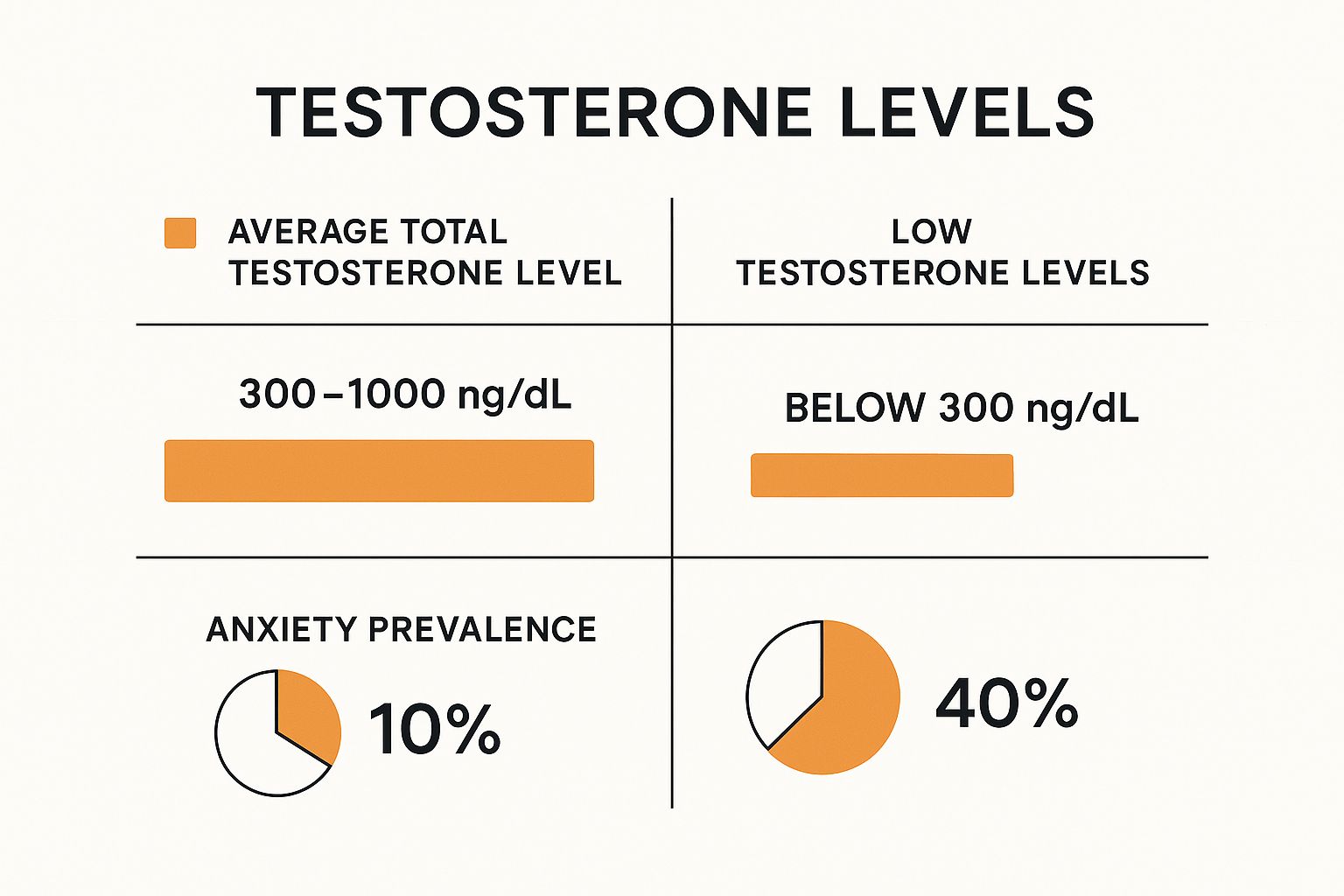
As the data shows, when testosterone dips below that normal threshold of 300 ng/dL, anxiety rates jump significantly. It's a clear visual that reinforces why effective treatment is so important.
Understanding Testosterone Replacement Therapy
TRT isn't a one-size-fits-all fix; it's a personalized medical treatment that needs to be supervised by a healthcare professional. It comes in a few different forms, each with its own way of getting the job done.
- Intramuscular Injections: These are given directly into a muscle, usually every one to two weeks. This method is highly effective and gives your doctor precise control over your dosage.
- Transdermal Gels or Patches: You apply these to your skin daily. They provide a steady, consistent release of testosterone throughout the day, which mimics your body’s natural rhythm.
- Subdermal Pellets: These are tiny pellets surgically implanted under the skin, often in the hip area. They slowly release testosterone over three to six months, making them a convenient, low-maintenance option.
The biggest benefit of TRT for low testosterone and anxiety is its ability to re-stabilize the very brain chemistry that testosterone helps regulate. By restoring your levels, many men feel a real drop in irritability, a lifting of that persistent brain fog, and a renewed sense of calm and control.
Of course, it's crucial to have a transparent talk with your doctor about potential risks, which can include side effects like acne, sleep apnea, or changes in red blood cell counts. For a deeper look into the specifics, you can explore various low testosterone treatment options to see what might be the right fit for you.
Powerful Lifestyle Strategies For Hormonal Health
While TRT can be a game-changer, it works best when it's built on a foundation of healthy habits. Think of it this way: lifestyle changes can amplify the effects of your treatment while also giving your body the natural support it needs to produce its own hormones and build mental resilience.
These strategies create an environment where your hormones can actually thrive.
"Lifestyle changes are not a replacement for necessary medical treatment, but they are a critical partner. They empower you to take an active role in your own health, creating sustainable well-being that goes beyond just a prescription."
A targeted approach to your daily routine can make a huge difference in both your testosterone levels and your anxiety.
Nutrition For Hormonal Balance
What you put on your plate has a direct line to your endocrine system. A diet that supports testosterone is rich in a few key nutrients.
- Zinc-Rich Foods: Oysters, beef, and pumpkin seeds are loaded with zinc, a mineral that’s absolutely essential for producing testosterone.
- Healthy Fats: Think avocados, nuts, and olive oil. These foods provide the raw materials your body needs to create hormones.
- Vitamin D: Often called the "sunshine vitamin," having enough Vitamin D is strongly linked to healthy testosterone. If you don't get much sun, consider fortified foods, fatty fish, or a supplement.
Exercise For Mind and Body
Getting moving is one of the most effective natural ways to boost testosterone and fight back against anxiety.
- Strength Training: Lifting weights and other resistance exercises have been proven to stimulate testosterone production. Focus on big, compound movements like squats, deadlifts, and bench presses to get the most impact.
- High-Intensity Interval Training (HIIT): Short, intense bursts of exercise followed by brief recovery periods are also great for supporting healthy hormone levels and burning off stress.
Stress Reduction and Sleep Optimization
Finally, getting a handle on cortisol—the stress hormone—is non-negotiable. Chronic stress sends cortisol levels soaring, which directly suppresses testosterone production.
- Prioritize Sleep: Aim for 7-9 hours of quality sleep every night. Skimping on sleep is one of the fastest ways to crush your testosterone levels.
- Practice Mindfulness: Things like meditation, deep breathing exercises, or even just taking a quiet walk outside can lower cortisol and help calm an overactive nervous system.
Comparing Treatment Approaches for Low T and Anxiety
Deciding on the best path forward involves weighing the pros and cons of medical intervention versus lifestyle changes. While they work best together, it's helpful to see how they stack up side-by-side.
| Factor | Testosterone Replacement Therapy (TRT) | Lifestyle Modifications |
|---|---|---|
| Primary Goal | Directly restore testosterone to optimal levels. | Support natural hormone production and improve overall health. |
| Speed of Results | Can produce noticeable changes within weeks to a few months. | Slower, more gradual improvements over several months. |
| Mechanism | Medical supplementation of testosterone. | Nutritional support, exercise, stress reduction, and sleep. |
| Level of Control | Precise dosage adjustments made by a doctor. | Results vary based on individual consistency and effort. |
| Required Commitment | Adherence to medical appointments and prescribed regimen. | Requires consistent, long-term changes to daily habits. |
| Potential Risks | Side effects like acne, sleep apnea, or blood count changes. | Minimal risk, primarily related to overexertion or injury. |
This table makes it clear that TRT offers a direct and controlled method for hormonal correction, while lifestyle changes provide a foundational, holistic approach.
By combining a medical treatment like TRT with these powerful lifestyle adjustments, you create a complete strategy for tackling low testosterone and anxiety from every possible angle. This approach doesn't just restore your hormonal balance—it builds a resilient foundation for long-term mental and physical health.
Navigating Your First Few Months of Treatment

Starting treatment for low testosterone is a major step forward, and it’s completely normal to feel a mix of excitement and a little uncertainty. Knowing what’s coming in these initial months can make the whole process feel much less intimidating. Think of this phase as your body recalibrating—progress will happen, but it’s a marathon, not a sprint.
Patience is your best friend right now. While some guys feel a subtle shift in energy or mood within the first couple of weeks, the deeper changes, especially with mental health, take time to unfold. Your body needs a chance to adapt to restored hormone levels, and the complex link between low testosterone and anxiety won’t just vanish overnight.
What To Expect Early On
In the first one to two months, don't be surprised if you notice physical improvements before the mental fog really starts to lift. This is a great sign that the treatment is working exactly as it should.
- Increased Energy and Stamina: One of the very first things many men notice is that the deep, bone-weary fatigue starts to fade. You might find it easier to power through your workday or still have something left in the tank for your family in the evening.
- Improved Libido: A welcome return of your sex drive is a very common early indicator that your hormone levels are on the rise.
- Better Sleep Quality: Many men report that they start sleeping more deeply and wake up feeling genuinely rested as their hormones find a new balance.
These early physical wins can have a powerful ripple effect on your anxiety. When you feel more energetic and capable, the daily grind feels less overwhelming, laying a solid foundation for the mental clarity that’s on its way.
"The first few months of treatment are about building momentum. Each small improvement, whether in the gym or your general mood, is a building block for long-term well-being. Trust the process and communicate openly with your doctor."
The Timeline For Mental Clarity
While your body often responds quickly, the psychological benefits—like a serious drop in anxiety—tend to follow a more gradual path. The brain’s chemistry is incredibly complex and simply takes longer to rewire itself.
Most clinical experience shows that significant improvements in mood, motivation, and anxiety really become noticeable around the three to six-month mark. During this time, you may start to realize you have:
- A calmer response to stressful situations.
- Fewer moments of irritability or unpredictable mood swings.
- A decrease in that constant, nagging worry that anxiety feeds on.
This is also when open communication with your doctor becomes absolutely essential. Those follow-up appointments and blood tests aren't just a box-ticking exercise; they are crucial for fine-tuning your protocol. Your physician will be monitoring your hormone levels to make sure they’re in the optimal range, adjusting your dose as needed. This optimization process is the key to getting the best possible results for both your physical and mental health, ensuring your journey to overcome low testosterone and anxiety is both safe and effective.
The Role of Testosterone in Women's Mental Health
While this guide focuses heavily on the link between low testosterone and anxiety in men, it’s a conversation that absolutely includes women. Testosterone isn't just a "male" hormone; it's a vital chemical messenger for women’s health, playing a huge part in mood, energy, and even how sharp we feel.
Think of a woman's hormonal health as a finely tuned orchestra with three main conductors: estrogen, progesterone, and testosterone. When one conductor’s rhythm is off, the entire symphony can fall into disarray. For women, a dip in testosterone can throw off this delicate balance, contributing to feelings of anxiety, deep-seated fatigue, and a noticeable drop in mental clarity.
The Nuances of Female Hormonal Balance
In women, testosterone levels are naturally much lower than in men, but that small amount is incredibly potent. Its decline—which can happen with age, adrenal fatigue, or certain medical conditions—can trigger symptoms that are often mistaken for purely psychological issues.
The connection is becoming clearer as the research continues. Emerging studies show that for women, just as for men, having enough testosterone is linked to better mental resilience. For instance, one key study found that higher total testosterone was significantly related to lower anxiety scores in women. In fact, each unit increase in testosterone was associated with reduced odds of having anxiety symptoms. You can read the full research about these findings to dig into the data yourself.
The impact of low testosterone on anxiety is not limited to a single gender. For women, this hormone is a key piece of the mental wellness puzzle, influencing everything from mood stability to their response to stress.
Recognizing the signs of a hormonal imbalance is the first step toward getting the right support. You can learn more by exploring the common low testosterone symptoms in females in our detailed guide. Acknowledging this connection is crucial for a complete understanding of how hormones shape mental health for everyone.
Your Questions Answered: Expert Insights on Testosterone and Anxiety
When you're trying to connect the dots between low testosterone and anxiety, a lot of questions come up. Getting clear, straightforward answers is the best way to feel confident about your health decisions. Let’s tackle some of the most common concerns head-on to clear up any lingering doubts.
Will TRT Completely Cure My Anxiety?
It's a great question, but the answer isn't a simple yes or no. Think of Testosterone Replacement Therapy (TRT) as a highly specialized tool, not a magic wand. If low testosterone is the main reason you're feeling anxious, then yes, TRT can be incredibly effective—sometimes even resolving the issue entirely.
However, anxiety is often a complex beast with roots in psychological or situational stress. In those cases, TRT is one crucial piece of a much larger puzzle. It fixes the hormonal foundation, giving you the stability needed to effectively address any other contributing factors through therapy, stress management, or other lifestyle changes.
The real goal of TRT is to restore your body’s hormonal baseline. By correcting that physiological imbalance, it puts you in a much stronger position to manage all the other things that might be fueling your anxiety.
How Long Until I Start Feeling Less Anxious?
Patience is key here because everyone’s body responds on its own timeline. Some guys report a noticeable lift in their mood and a drop in anxiety within just a few weeks of starting treatment. It can be that fast for some.
For others, the full psychological benefits take a bit longer to lock in, usually settling around the three to six-month mark. You'll likely notice physical improvements like better energy and libido much sooner. The most important things you can do are stay consistent with your treatment and keep an open line of communication with your doctor to make sure your protocol is dialed in perfectly for you.
Is It Dangerous to Take Testosterone Without a Medical Need?
Absolutely. Taking testosterone when your levels are already normal is not just risky—it's counterproductive. Using testosterone without a confirmed diagnosis of hypogonadism can throw your body's natural hormone production completely out of whack, creating the very imbalances you're trying to solve.
This can trigger a whole host of unwanted side effects, including:
- Unpredictable mood swings and even more irritability
- Unnecessary stress on your heart and cardiovascular system
- A range of other serious health complications
TRT should only ever be started under the supervision of a qualified doctor after a full workup, including blood tests and a thorough review of your symptoms. That’s the only way to ensure your treatment is both safe and genuinely effective.
At Elite Bioscience, we’re here to provide the clarity and support you need to take control of your hormonal health. Our team specializes in creating personalized treatment plans based on precise diagnostics to help you get back to feeling like yourself. Take the first step by exploring our TRT programs today. Learn more at https://elitebioscience.co.
QUICK SEARCH
Make an account today to start your journey towards a better and healthier lifestyle.




